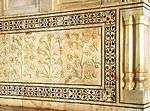dado
English


Pronunciation
- (Received Pronunciation) IPA(key): /ˈdeɪdəʊ/
- (US) IPA(key): /ˈdeɪdoʊ/
Audio (US) (file) Audio (AU) (file) - Rhymes: -eɪdəʊ
Noun
- (architecture) The section of a pedestal above the base.
- (architecture) The lower portion of an interior wall decorated differently from the upper portion.
- (carpentry) The rectangular channel in a board cut across the grain.
Translations
Verb
dado (third-person singular simple present dadoes, present participle dadoing, simple past and past participle dadoed)
- (transitive, architecture) To furnish with a dado.
- (transitive, carpentry) To cut a dado.
Translations
Derived terms
Galician
Etymology
From Old Portuguese dado, from Latin dātus.
Italian
Etymology
Uncertain. Perhaps from a Vulgar Latin *dadu, itself either from Latin datum (“thrown, given”), or from Arabic أَعْدَاد (ʾaʿdād, “numbers”). Compare Spanish and Portuguese dado, Catalan dau, French dé.
Pronunciation
- IPA(key): /ˈda.do/
- Hyphenation: dà‧do
- Rhymes: -ado
Noun
dado m (plural dadi)
- (gaming) die, dice
- giocare a dadi ― to play dice
- (by extension) any small cube-shaped object
- (cooking) stock cube
- minestra di dadi ― (please add an English translation of this usage example)
- (engineering) nut (intended to be screwed onto a bolt)
Old Portuguese
Etymology
From Vulgar Latin *dadu, itself either from Arabic أَعْدَاد (ʾaʿdād, “numbers”), or from Latin dātum.
Pronunciation
- IPA(key): /ˈda.do/
Noun
dado m
- die
- 13th century, attributed to Alfonso X of Castile, Cantigas de Santa Maria, E codex, cantiga 294 (facsimile):
- Como hũa moller q̇ iogaua os dados en pulla lançou hũa pedra aa omagen de ſ[ant]a mari[a] por q̇ perdera ⁊ parou un angeo de pedra que y eſtava a mão ⁊ reçibiu o colpe.
- How a woman who was playing dice in Apulia threw a stone at the statue of Holy Mary because she had lost, and an angel of stone which was there reached out its hand and received the blow.
- Como hũa moller q̇ iogaua os dados en pulla lançou hũa pedra aa omagen de ſ[ant]a mari[a] por q̇ perdera ⁊ parou un angeo de pedra que y eſtava a mão ⁊ reçibiu o colpe.
- 13th century, attributed to Alfonso X of Castile, Cantigas de Santa Maria, E codex, cantiga 294 (facsimile):
Pali
Alternative forms
- 𑀤𑀤𑁄 (Brahmi script)
- ददो (Devanagari script)
- দদো (Bengali script)
- දදො (Sinhalese script)
- ဒဒေါ (Burmese script)
- ทโท (Thai script)
- ᨴᨴᩮᩣ (Tai Tham script)
- ទទោ (Khmer script)
Portuguese
Pronunciation
- (Portugal) IPA(key): /ˈda.ðu/
- Hyphenation: da‧do
- Rhymes: -adu
Etymology 1
From Old Portuguese dado, itself from a Vulgar Latin *dadu, of uncertain origin; possibly from Classical Arabic أَعْدَاد (ʾaʿdād, “numbers”), or from Latin datum. Compare Spanish dado, Catalan dau, Italian dado, French dé.
Noun
dado m (plural dados)
Etymology 2
From Old Portuguese dado, from Latin datus. See dar.
Adjective
dado m (feminine singular dada, masculine plural dados, feminine plural dadas, comparable)
Noun
dado m (plural dados)
Pronoun
dado m (plural dados, feminine dada, feminine plural dadas)
- a given; a particular; a specific
- Em dado momento, os morcegos sairão da caverna.
- The bats will leave the cave in a given moment.
- A família mora em uma dada localidade no vale.
- The family lives in a given location in the valley.
Usage notes
Optionally used with an article.
Spanish
Pronunciation
- IPA(key): /ˈdado/, [ˈd̪aðo]
- Hyphenation: da‧do
Etymology 1
From a Vulgar Latin *dadu, of uncertain origin; perhaps from Arabic أَعْدَاد (ʾaʿdād, “numbers”), or alternatively from Latin dātum. Compare Portuguese dado, Catalan dau, Italian dado. Cf. also French dé.
Verb
dado m (feminine singular dada, masculine plural dados, feminine plural dadas)
- Masculine singular past participle of dar.